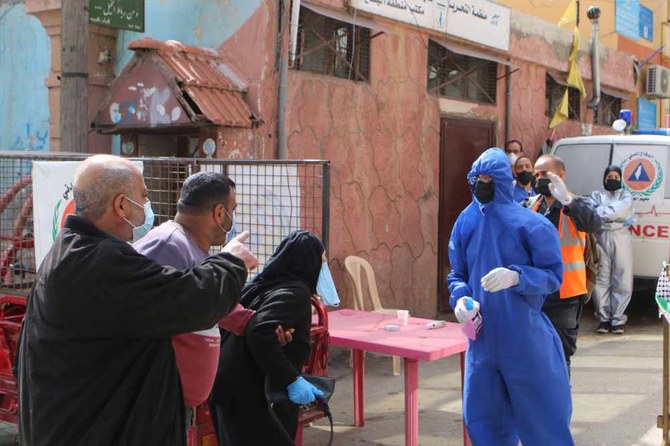BEIRUT: A refugee camp in Lebanon was sealed off and under lockdown on Wednesday after a Palestinian woman from Syria tested positive for the coronavirus.
The woman, who lived in the Wavel camp in Baalbek, known locally as the Jalil or Galilee camp, was taken to Rafik Hariri Hospital in Beirut for treatment.
A medical team from the UN refugee agency UNRWA and hospital staff tested 146 people at the camp, home to about 3,000 people, including all those who had recent contact with the woman.
Lebanon hosts tens of thousands of Palestinian refugees and their descendants, mostly in squalid camps with no access to public services and limited health care. There are also more than 1 million refugees from the conflict in Syria.
Wednesday’s virus case is the first inside one of the camps, but aid workers have warned for months that if the COVID-19 pandemic reached the camps it could cause carnage.
“There is always concern of an outbreak in a crowded place like the camps ... but we hope that the measures we are taking with the ministry and others concerned will help us avoid an outbreak,” said Huda Samra, communications adviser for UNRWA in Lebanon.
The Popular Committee inside the Wavel camp urged people to stay at home, close shops, and sanitize neighborhoods, houses and cars.
Lebanon’s Health Ministry reported five new COVID-19 cases on Wednesday, including two in Rayak in the Bekaa Valley, raising the total to 682. One patient with underlying health issues died, raising the death toll to 22.
Dr. Iman Shankiti, the World Health Organization (WHO) representative in Lebanon, urged patience, and said measures taken to prevent the spread of the virus should continue.
The US Embassy offered $13.3 million to help stop the spread of COVID-19 in Lebanon, including an $8 million donation to UNHCR.
Saudi Arabia recorded 1,141 new cases of COVID-19 on Wednesday, bringing the total to 12,772. Six patients died, raising the death toll to 114.
In the Middle East’s worst-hit country, Iran, 94 more people died, raising the total 5,391 from 85,996 confirmed cases.
Egypt’s parliament on Wednesday amended the state of emergency law to give President Abdel Fattah El-Sisi power to ban public and private meetings, protests, celebrations and other forms of assembly, suspend classes at schools and universities, and quarantine people returning from abroad.
Egypt has recorded nearly 3,500 cases of the virus, with 264 deaths.
Jordan eased movement restrictions on Wednesday in the large and sparsely populated southern districts of Karak, Maan and Tafileh, where no coronavirus cases have been reported. In Karak city, 120 km south of Amman, heavy traffic clogged the streets.
Jordan has recorded 428 positive cases of the virus and seven deaths.
Worldwide, the number of people infected with the coronavirus passed 2.6 million, and the death toll rose to more than 182,000.

























